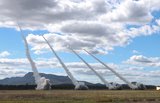Australia looks towards space with force restructure, investment and training
Australia is looking to improve its presence in space with a focus on communications and creating a dedicated segment of its defence forces committed to the domain.
Harris Corporation has been awarded a $47 million order to supply wideband radio systems to a Middle East nation, the company announced on 13 March.
The radio system order is part of the unnamed nation's continuing tactical communications modernisation programme.
The systems will be used to support a command, control, communications, computers, intelligence, surveillance and reconnaissance (C4ISR) network used by the nation's military and security forces.
This network integrates software-defined Harris Falcon III RF-7800 tactical radios, which include the RF-7800H wideband high-frequency radio, RF-7800V combat net radio, RF-7800M multiband networking radio and RF-7800I vehicular intercom systems.
Brendan O'Connell, president, tactical communications, Harris RF Communications, said: 'These systems provide this nation's forces with critical real-time tactical information and enable seamless communications across the breadth of the entire brigade combat team.
'Harris Falcon radios are increasingly being integrated into tactical communication systems that connect headquarters to the field through real-time voice, data and ISR feeds.'
The Harris Falcon family of software-defined tactical radio systems includes handheld, man-pack and vehicle applications. The Falcon III family is a next-generation family of radio systems that supports the US military's joint tactical radio system requirements and network-centric operations worldwide.

Australia is looking to improve its presence in space with a focus on communications and creating a dedicated segment of its defence forces committed to the domain.

The Portuguese company’s naval communications system is in service across more than a dozen countries. It has turned to its home nation for support in developing a new vehicle based C2 system.

The Vision4ce Deep Embedded Feature Tracking (DEFT) technology software is designed to process video and images by blending traditional computer vision with artificial intelligence (AI) algorithms to present actionable information from complex environments.

Persistent Systems has been cleared by National Security Agency (NSA) to transmit sensitive data on commercial networks. The devices are added to the NSA’s Commercial Solutions for Classified (CSfC) component list which also includes other companies’ products providing the same security.

The release of the UK’s Strategic Defence Review (SDR) has been long promised as mid-year. It is possible it could be as early as 2 June although the UK Ministry of Defence (MoD) continues to play its cards close to its chest.

Intelsat outlines how its multi-orbit SATCOM architecture is enhancing connectivity and resilience for special operations forces operating in degraded and contested environments.